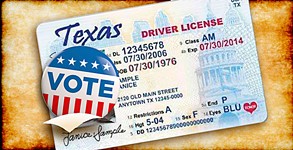Point Austin: Intentional Ignorance
5th Circuit goes out of its way to avoid pointing the finger on Voter ID
By Michael King, Fri., Aug. 14, 2015

So few good decisions come out of the 5th Circuit Court of Appeals – redoubt of capital punishment and bane of women's reproductive rights – that when the judges issue a relatively sane opinion, the reflexive reaction is, "What's the catch?" That was my immediate thought when I learned that the court had rejected (in part) the state's 2011 Voter ID law (aka "SB 14"), which had created a narrow list of "acceptable" identifications for the polls, placing a particular burden on poor and minority Texas voters.
It didn't take long to spot the catch in the August 5 opinion issued by a three-judge panel: While the judges affirmed the state district court's ruling that the law is discriminatory in impact against black and Latino voters, they did not concur that the discrimination was intentional. Rather, the opinion spends much of its time parsing the district court ruling in order to undermine any evidence that Republican lawmakers knew exactly what they were doing when they made it more difficult to vote. And rather than strike down the law, the court remanded the case to U.S. District Judge Nelva Gonzales Ramos for another review. If Gonzales Ramos can't confirm more current evidence of explicit discrimination, the best the panel offers is perhaps adding voter registration cards to the list of acceptable identifications.
So, it's half a victory, and the law remains in effect pending district court action and another round of appeals. (There's also a good chance the state will ask for full-court review.) Had the judges agreed that the law was enacted with discriminatory intent, there was at least the possibility of an injunction and beyond that, the restoration of the "preclearance" requirement of the Voting Rights Act, which the Supreme Court has negligently scuttled.
A Little Knowledge
Meanwhile, the law has certainly had its intended impact of suppressing minority voting. The latest evidence is a study from the University of Houston (Hobby Center for Public Policy) and Rice University (Baker Institute for Public Policy). The researchers interviewed voters in the 2014 23rd Congressional District election (narrowly won by Republican Will Hurd over Democrat Pete Gallego), and found that at least 5.8% of registered voters cited the lack of approved ID as the "principal" reason they had not voted; 12.8% cited the law as one of the reasons. Moreover, the researchers report, "The law kept far more Gallego than Hurd supporters away from the polls last fall."
The scale of the survey made it impossible to confirm that SB 14 cost Gallego the close election (a 2% margin of 2,400 votes among 115,000), but the report does conclude that "Gallego was far more adversely affected by the impact of the voter ID law on voter participation than was Hurd." The additional, crucial information provided by the survey is that many of those potential voters were in fact mistaken about not having at least one of the correct forms of ID; they stayed away from the polls because they knew of the law but not its details. "The negative impact of the voter ID law on Gallego's electoral performance," the report concludes, "was however overwhelmingly the product of a lack of knowledge and/or confusion regarding the requirements of the law among the potential Gallego voters."
More broadly, "The most prominent impact of the legislation was that due entirely to a misunderstanding or a general lack of information of the photo identification requirements under the law, somewhere between one out of every 10 and one out of every 20 non-voters in CD-23 did not participate in the general election process in 2014."
Discrimination Accomplished
So SB 14 has done its work, at least in one contested election, although it functioned not in the obvious way – directly blocking voters from the polls – but by spreading sufficient confusion among registered but unsophisticated voters to discourage them from making the effort. Obviously, some burden is on the state Democratic Party to reach out to as many of those potential voters as possible, rather than wait for Congress or legal appeals (including to an indifferent or hostile Supreme Court majority) to perhaps move back in the direction of a full-bodied Voting Rights Act.
But it is primarily the responsibility of the state of Texas – as sanctimoniously promised by the Republican-dominated Legislature when defending this legislation – to make certain that every potential voting Texan has ready access to one of the designated forms of identification, and to adequately educate the public of registered voters that they likely have a legal ID, or can get one – even in CD 23, which sprawls from San Antonio across West Texas to the edge of El Paso. Indeed, as the 5th Circuit casually suggested, a voter's registration card should be quite enough to enable a Texan to vote. But that will require either a Supreme Court epiphany – or legislators abandoning the fiction that they didn't know exactly what they were doing when they restricted the right to vote.
Got something to say on the subject? Send a letter to the editor.










